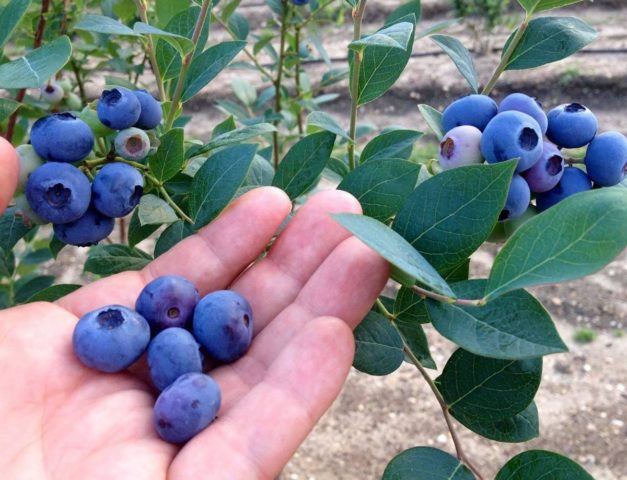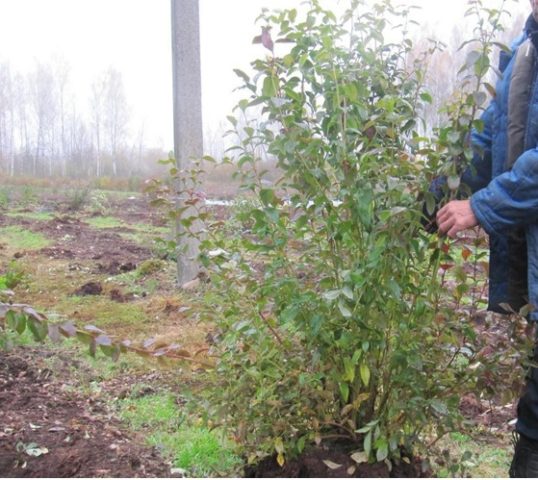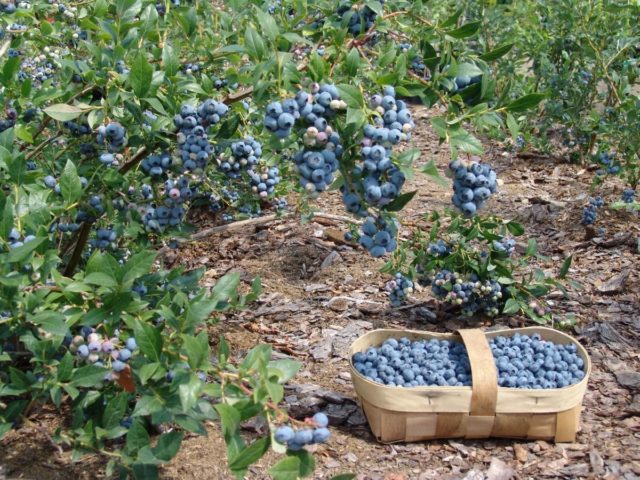Content
Blueberry Country is a cultivar native to the United States. It was created by American breeders more than 30 years ago; it is grown on an industrial scale in this country. In the collection of the Main Botanical Garden of the Russian Academy of Sciences, there are more than 20 varieties of garden blueberries, including North Country. However, unlike American farmers who create blueberry plantations, domestic summer residents grow it exclusively for personal purposes.
Description of the North Country blueberry variety
The description of the North Country blueberry variety makes it clear that this species has its own characteristics, which you need to know about even before planting a plant.
Features of fruiting
North Country is a blueberry variety that has high yields and is unpretentious in terms of climatic conditions - blueberries can withstand frosts down to -40 degrees, so they can be cultivated not only in the middle lane, but in the Urals and Siberia.
Bushes of the North Country variety are considered low (about 80 cm), its shoots are straight and very strong. The foliage of the plants is narrow, colored bright green throughout the season, and in the fall changes color to red-pink.
North Country belongs to a self-infertile variety, therefore, the fruiting of a crop without the presence of pollinators is impossible. In view of this, any other varieties of berries (at least two types) must be planted in the vicinity of this blueberry variety.
North Country fruits are numerous, have an even round shape and a dark blue color. When ripe, the berries do not fall, they can sag on the branches for more than a month. The first berry appears at the end of July, but ripens unevenly.
The taste characteristics of the fruits are high, their purpose is universal. Can be used fresh, stored for a long time in a cool place, cook jams and compotes.
The North Country yield is high, at least 2 kg of berries grow on each bush. External conditions do not affect the number of fruits.
Advantages and disadvantages
Experienced gardeners know that each plant has its own advantages and disadvantages. The pluses of North Country blueberries include the following:
- high productivity;
- frost resistance;
- resistance to various diseases and pests (blueberries can independently fight not only insects, but also fungi);
- the possibility of successful transportation.
Of the minuses, only the need for constant acidification of the soil and the small size of the berries are noted.
Breeding features
Like all other blueberry varieties, North Country can be propagated in three ways - seeds, cuttings, and dividing the bush. Reproduction by cuttings is considered the most popular and effective. To do this, choose a suitable twig, cut it off from the bush, and root it in a mixture of sand and peat. After rooting (at least a year), the seedling can be planted in a permanent place.
Seed propagation is no less difficult, you just need to sow blueberries in peat, plant a seedling in open ground after 2 years. In this case, the fruits will appear no earlier than 5 years later.
Dividing a bush is considered not the best way of reproduction, rooting of blueberries in this case is problematic, since the root system of the plant suffers greatly during division.
Planting and leaving
North Country is a light-loving blueberry variety that is demanding on the composition of the soil. Therefore, the main factor affecting the yield is the right choice of planting site.
Recommended timing
North Country blueberries can be planted in both fall and spring. The latter option is considered the most preferable, since over the summer the root system of the plant will have time to get stronger, allowing the blueberries to winter safely.
Site selection and soil preparation
A sunny area protected from gusts of wind and drafts - this is the place to choose for planting North Country blueberries. As for the soil, all varieties of this berry love an acidic substrate, this must be taken care of before planting seedlings so that they can take root without problems.
Soil preparation consists in mixing in equal proportions the following components:
- peat;
- sand;
- coniferous sawdust or fallen needles.
Landing algorithm
Before planting a young seedling, you need to dig a hole that will correspond to the following dimensions - 40 cm deep, 40 cm in diameter. You need to prepare the hole a couple of months before planting blueberries, so that the earth has time to sink.
After the planting hole is ready, you should place a seedling in it, level the roots along the entire diameter of the hole and sprinkle it with ready-made soil. Apply a layer of mulch on top - it can be ordinary sawdust, dry foliage or needles. All this will help to retain moisture at the roots, which quickly evaporates from the prepared substrate.
The next step is abundant watering. On the planted bush, you need to immediately prepare at least 10 liters of warm, better settled, water.
Growing and care
From the description of the North Country blueberry variety, it can be understood that the plant is one of the unpretentious. However, some rules for caring for him must be observed in order to get the desired harvest.
Watering schedule
The first few weeks after planting, blueberries are watered twice a week. The procedure should be performed in the evening or early morning, before sunrise. It is not recommended to overmoisten the substrate - prolonged stagnation of water can lead to the death of the plant, therefore it is necessary to focus on the state of the soil and climatic conditions, adhering to the "golden" mean.
After the roots of the plant get stronger, the number of watering is reduced to once a week, while at the time of flowering and fruit formation, it is necessary to double the dosage of water.
Feeding schedule
Soil acidity is an important factor that every gardener should pay attention to when growing any blueberry variety. With insufficient acidity, the foliage on the bush becomes withered and yellowish. The situation will be corrected by periodically watering the plant with water with the addition of table vinegar or citric acid. It is enough to add about a glass of vinegar or 8 - 10 tablespoons of lemon to a bucket of water.
Feeding North Country blueberries is also an important factor in growing. Blueberries do not tolerate organic fertilizers, so the use of manure, mullein or humus is prohibited.
For plant growth, the necessary minerals (complexes containing phosphorus, potassium, nitrogen, etc.). The first feeding is carried out in the second year of blueberry life in the spring. The second portion of the nutrients is introduced in July.
Pruning
For the first 5 years, blueberries can only be pruned for sanitary purposes, removing dried branches if available.Subsequently, pruning is rejuvenating, young branches must be left on the bush, completely eliminating old shoots.
Preparing for winter
North Country doesn't need winter shelter. Even in harsh climatic conditions, simply mulching the soil with sawdust or other suitable material will suffice.
Pests and diseases
The North Country blueberry, as can be seen from the description of the variety and reviews, is a resistant plant with a good immune system, so it rarely gets sick and can bear fruit for many years.
North Country blueberries are also not afraid of infectious and fungal diseases. But experienced gardeners recommend preventive treatment of the plant with antibacterial drugs and insect repellents. This can be done only in early spring or before frost. At the time of fruiting, the use of any chemical composition is prohibited.
Of the pests for this variety of blueberries, only birds can become dangerous, which will not mind eating fresh tasty berries. You can protect the plant by covering it with a regular net.
Conclusion
Country blueberry is a berry variety that every year becomes more and more popular among compatriots. It is quite possible that North Country in the near future will be grown on a production scale, and not only on personal plots.
North Country blueberry reviews











